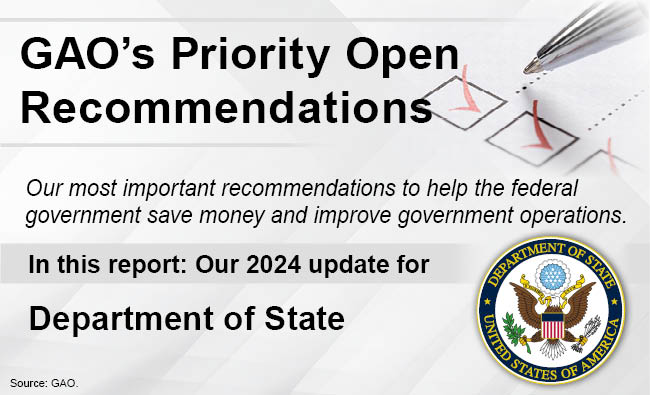Priority Open Recommendations: Department of State
Fast Facts
Each year, we make more than 1,000 recommendations to help the federal government save money, address issues on our High Risk List, and significantly improve government operations.
This letter to the State Department outlines 13 open recommendations that it should prioritize. For example, we recommended that State more systematically track foreign assistance funds provided in response to the crisis in Ukraine. This will help U.S. agencies ensure the accountability of these funds and inform decisions about future needs.
State implemented 5 recommendations we identified as a priority last year.
We regularly update priority recommendations here.

Highlights
What GAO Found
In May 2023, GAO identified 12 priority recommendations for the Department of State. Since then, State has implemented 5 of those recommendations by, among other things, taking actions to help assess overseas posts' preparedness to respond to crises.
In June 2024, GAO identified 6 additional priority recommendations for State, bringing the total number to 13. These recommendations involve the following areas:
- improving cybersecurity;
- improving data quality;
- improving overseas real property planning;
- complying with congressional reporting requirements;
- strengthening foreign assistance strategies; and (6) enhancing training efforts.
State's continued attention to these issues could lead to significant improvements in government operations.
Why GAO Did This Study
Priority open recommendations are the GAO recommendations that warrant priority attention from heads of key departments or agencies because their implementation could save large amounts of money; improve congressional or executive branch decision-making on major issues; eliminate mismanagement, fraud, and abuse; or ensure that programs comply with laws and funds are legally spent, among other benefits. Since 2015 GAO has sent letters to selected agencies to highlight the importance of implementing such recommendations.
For more information, contact Kimberly Gianopoulos at (202) 512-8612 or gianopoulosk@gao.gov.
